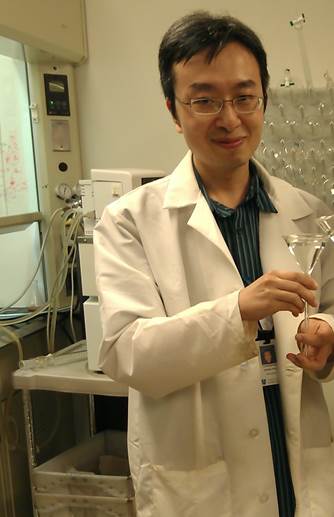The Daily Free Press recounts the HUBWeek event in which Center Director Bruce Rosen and medical illustrator Danny Quirk spoke about the intersectionality of human anatomy and visual art.
Harvard Catalyst Fund supports epigenetic imaging project with new PET imaging probe
 |
|
Martinostat – not Martini, stat: Changning Wang prepares glassware for his next breakthrough in the chemistry lab (where he never eats or drinks). (Photo courtesy of Changning Wang.) |
The Martinos Center’s Changning Wang, a postdoctoral fellow in the Hooker Research Group, has been awarded a grant from the Harvard Catalyst resource. Wang’s proposal outlines human PET imaging experiments to investigate the epigenetic mechanisms involved in age-related diseases, such as Alzheimer’s disease.
Growing evidence implicates histone deacetylase (HDAC) enzymes as key epigenetic machinery underlying cognition and memory. Until recently, there were no tools to measure the density and distribution of HDAC targets in the living brain. This significantly limited our understanding of how HDACs contribute to normal and diseased brain function. Wang has developed a novel, noninvasive PET imaging probe, [11C]Martinostat, that permits measurement of HDAC expression throughout the human brain using PET imaging (read more about [11C]Martinostat here).
Since this discovery, investigators in the Hooker Research Group have already successfully imaged eight healthy young adults (18-35 years old) using [11C]Martinostat-PET. Wang’s award from the Harvard Catalyst - the Early Clinical Data Support for Grant Submissions award - will support the PET imaging of older controls and, in the future, patients with Alzheimer’s disease.
In addition to the imaging probe, Wang has also developed a number of small, drug-like HDAC inhibitor molecules, improving on examples developed for treating aspects of neurodegenerative disease in animal models. Blocking the function of HDAC enzymes may lead to new and improved treatments for brain disease. Wang’s chemistry efforts were also recognized by the Alzheimer’s Drug Discovery Foundation, which recently awarded him a Young Investigator Scholarship. This scholarship will send him to present his work at the Alzheimer's Drug Discovery Foundation (ADDF) Conference in San Diego this coming March.


